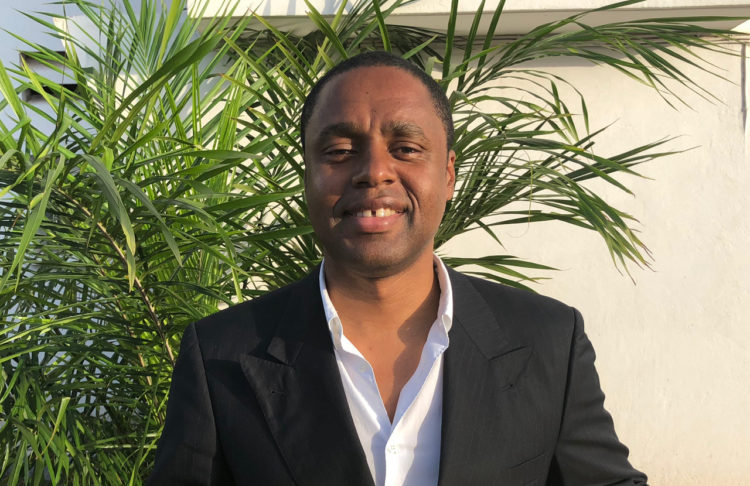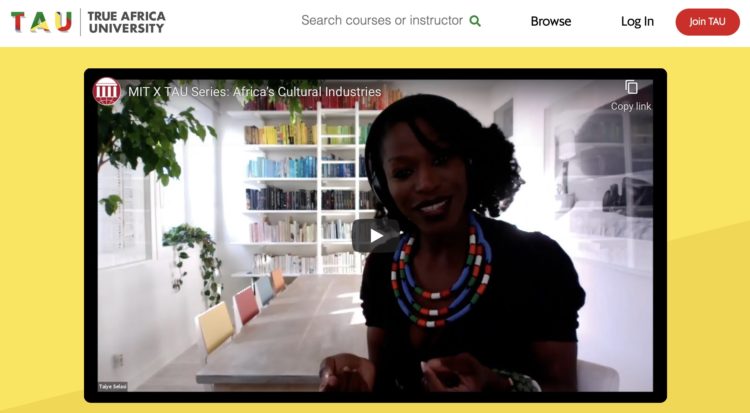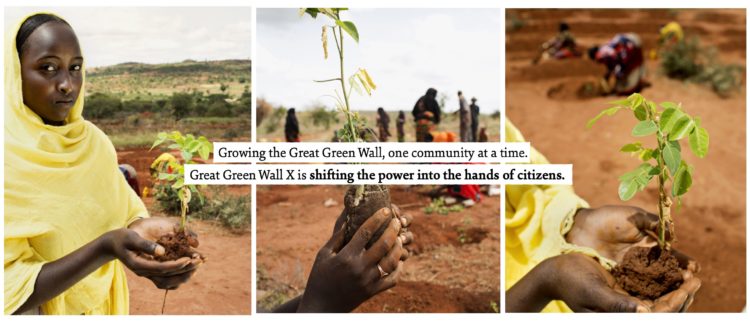As a native son of Togo, I’ve always felt that I could, one day, help change the destiny of the African continent. When I was a child growing up in Lomé, I could see that some things were wrong with our educational system, most of which was imported from post-colonial France. In primary school, I noticed that Western experiments and inventions were often considered superior to our own African traditions and imaginations.

I was a child with a lot of imagination, and my parents valued African lifestyles, even though my dad was partly educated in France. The particular kind of African pride I was raised around had everything to do with self-determination, resilience and respect for knowledge. I became a very good student, and I ended up attending some of the best schools in Washington, Paris and London, cities I moved to at a young age as a self-described “serial immigrant.”
In London, I chose journalism as my career, and I became a successful media entrepreneur when I was still in my twenties, having launched, out of my bedroom, a hip hop and urban culture magazine called TRACE. In 1998, I moved the TRACE operation to New York City, and the magazine venture took off. I became friendly with RZA and Alicia Keys, I was mentored by Bethann Hardison and Iman, my startup was funded by Goldman Sachs, and my business partner Richard Wayner and I launched a television network and other interactive platforms under the TRACE brand.
In 2010, we sold TRACE, and I found myself without a vision. I took some time off, for self-reflection, and eventually I decided to enroll at MIT, in the Sloan Fellows program. I wanted to become a student again. Even though I’d succeeded as an entrepreneur and now belonged to the category of self-made men, I knew that I had a lot to learn still, particularly about the ways in which the internet, increased connectivity, and network effects could change Africa, and the world, for the better.
My business instincts were stuck in the ways of traditional media however, and I felt that MIT was the best environment to unlearn and learn again. I graduated in 2012, earning an MBA. That year, Salman Khan, the MIT alumnus and founder of Khan Academy gave the Commencement address. He has been a hero of mine ever since he launched his non-profit online education company in 2006. In his address to the Class of 2012, Khan said that “MIT attracts and admits people with creative raw potential, people with unusual gifts, people who have the desire to and ability to push all of humanity forward.”
When I heard Salman Khan’s speech, I was 41. I’d spent my entire adult life as a journalist and media entrepreneur. On that day, as I was leaving the campus, I realized that I loved everything about MIT. That one-year Sloan Fellowship had turned into a transformative period in my life. It was a year in which I was able to re-evaluate my personal and professional choices, and learn from my mistakes, while reflecting on how I could finally contribute to improving the state of Africa. At MIT, I went from being a founder and CEO to a student, mentoring other MIT students along the way. And I became a much better listener during that year.
When I was in Sandy Pentland and Joost Bonsen’s “Development Ventures” class at MIT, I partnered with David Ly, a French-Senegalese MBA student, and with Matthieu Monsch, a French Operations Research PhD candidate. We started experimenting with an online directory platform for African businesses at the bottom of the pyramid. In January 2012, MIT funded our on-the-ground research in Togo, and while in Lomé we realized we were going nowhere fast. The Togolese people we interviewed and tested the idea on didn’t see a real need for that online directory platform.
In 2015, I settled on launching the TRUE Africa media platform with the support of Andrew McAngus, Ben Martin, Dan Reeves, Fleur Macdonald, Adora Mba and Ndeye Diobaye. I wanted to champion young African voices all over the world, because I felt that the African story wasn’t being told by Africans. We got off to a great start, and TRUE Africa even managed to secure funding from Google along the way, but deep down I felt that I could rally more troops—a few good men and women—and do more to reimagine the future of Africa.
With the TRUE Africa website, my team and I relied on our expertise in media, and our love of the African continent, but four years after launching TRUE Africa online, I realized that I wanted to solve an additional issue. It was time to tackle a potentially bigger problem than what we could accomplish through Facebook newsfeeds and innovative, on-the-ground reporting about young Africans and their creativity.
In 2019, I came to the conclusion that, while useful to telling a different story about modern Africa, an independent media platform wasn’t enough. That is when, after a conversation with my friend and business partner François-Xavier Huberlant, I decided to pivot to education, while continuing to push for homegrown African narratives via the TRUE Africa website. I finally had a new (and much bigger) vision that wasn’t derivative of the vision I had for TRACE when I was an ambitious 24-year-old journalist who wanted to see more talented Black people represented in the media.
My new vision, which was refined after a series of conversations and work sessions I had with François-Xavier and my Moroccan friend Bahia El Oddi—whom I’d met the previous year when I spoke to her Harvard Business School class—was to create, for higher education, a remote learning platform for thousands, and eventually millions of African youth. Together, we lamented the fact that, even though 60% of the population is under the age of 25, Africa is missing an opportunity to tap into its young talent. Africa remains the poorest continent, and I was determined to find actionable ways to nurture Africa’s talent beyond simply telling their stories on a media platform.
The pandemic, which led to the closure of many universities in Africa, gave a sense of urgency to my launch plans for the new venture, which I called TRUE Africa University. In reporting on the isolation of young African students for the TRUE Africa website, I realized that “blended learning”—the approach to education that combines online educational materials and opportunities for interaction online with traditional classroom methods—could be a viable solution for Africa.
Throughout the ideation process, several friends (including my MIT brothers Max Jahn and Erdin Beshimov) encouraged me. They loved the idea from the get go, and they felt that I was ready to take on this big project. With their help, I was able to convince Sanjay Sarma, the Vice President for Open Learning at MIT, who agreed to incubate TRUE Africa University at MIT J-WEL, the Abdul Latif Jameel World Education Lab which promotes excellence and transformation in education at MIT and worldwide.
On March 4th, we officially launched TRUE Africa University.
Our launch plans consist of an 11-week webinar series focused on various aspects of sustainable development in Africa. Every Thursday at noon ET, I am interviewing the thinkers, shapers and doers who I see as the inventors of the future of Africa. Produced in collaboration with the MIT Center for International Studies, the webinar series is an opportunity for the MIT community, the TRUE Africa community, and anyone who cares about Africa, to engage with luminaries such as Taiye Selasi, the Ghanaian-Nigerian author; Jeffrey Sachs, the American economist; and Iyinoluwa Aboyeji, the Nigerian serial entrepreneur behind some of Africa’s most valuable startups.

We launched the TRUE Africa University webinar series on March 4th with a film screening. It’s actually a film I executive produced, alongside Fernando Meirelles, the director of some of my favorite films, including City of God, The Constant Gardener and last year’s The Two Popes. Our documentary, The Great Green Wall, premiered at the Venice Film Festival in 2019, and won many awards in many countries.
The Great Green Wall is an African-led movement with an epic ambition to grow an 8,000 km natural wonder of the world across the entire width of Africa. It’s actually a wall of trees being planted from Senegal in the West all the way to Djibouti in the East. A decade in and roughly 15% underway, the initiative is already bringing life back to Africa’s degraded landscapes at an unprecedented scale, providing food security, jobs and a reason to stay for the millions who live along its path.
I moderated a post-screening panel discussion with Meirelles and other panelists, including Inna Modja, the Malian singer and model who is the lead protagonist of the film, and Kemo Fatty, a 29-year-old environmentalist from The Gambia, because I feel that most people, including people in Africa, are not aware of the devastating effects of climate change on the African continent, and on the prospects for African youth.

That screening, and our ongoing weekly webinars, are serving as launch pads for our upcoming course on “An African Perspective on Climate Change.” The webinars will set the tone for our higher learning ambitions with TRUE Africa University. We hope that our growing remote learning community will remain focused, as we are, on sustainable development in Africa. This is definitely the road less traveled, but we intend to help to identify new solutions by bringing in experts who can frame some of the major issues facing young Africans, as many of them seek new pathways to a brighter future for the continent.
You can register for all of our TRUE Africa University x MIT Zoom webinars here.
